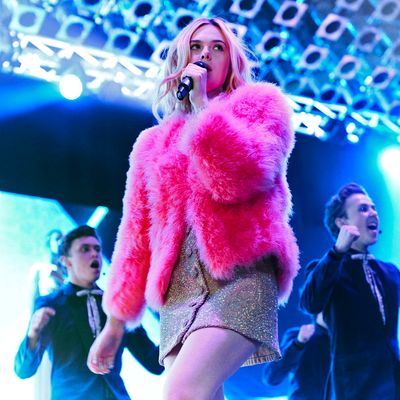
When does Teen Spirit take place? This isn’t a nitpicky question; it actually matters a great deal in terms of how we’re supposed to interpret its pop-music parable. The directing debut of actor Max Minghella centers around an American Idol–esque televised singing competition (or Pop Idol, given its U.K. setting), and its soundtrack is mostly built around left-of-center pop hits from the first part of this decade. The film opens with atmospheric magic-hour footage of Elle Fanning listening to her iPod on the bus and hanging out with a horse while Grimes’s “Oblivion” plays. That song was released in January of 2012. It was big on Tumblr. Was this going to be a period piece, I wondered when I first watched the movie, of a more innocent era before AirPods and Grimes’s pivot to billionaires?
The answer, as far as I can now tell, is no, though time and place don’t seem to have much bearing on the events of Teen Spirit. It’s a star-is-born story that, like its protagonist, is an empty vessel: anonymous and devoid of soul perhaps in an effort to be a surface onto which anyone could project, yet dull enough that few will want to. It follows the apparent pop-stardom breakout of Violet (Fanning,) a working-class teenager living on the Isle of Wight with her single mother (Agnieszka Grochowska). Violet loves to sing — in the church choir, in her bedroom to timeless hits from the Interscope back catalogue (the film is a co-production with the record label), after sneaking out to serenade pub drunks in the evening. But her mother forbids her pursuing anything like a career in singing. It’s a kind of arbitrary forbidding long used by screenwriters trying to give their young protagonists something to rebel against and build character through, but in this case we hardly know Violet before we’re being asked to root for her in a local tryout, which turns into a regional knockout round, which leads to a national semifinal. Minghella frames these high-pressure performances as tastefully realized music videos come to life, all on-trend bisexual lighting and Flashdance-y choreography sequences, kinetic and showy in a way that would be exciting if it was in any way emotionally earned.
Violet wants to sing. Does Violet want to be a pop star? This is posed as the the driving question of the film, but nothing about Fanning’s performance suggests a desire for much of anything. Violet is “discovered” at the pub by an alcoholic former opera star named Vlad (Zlatko Burić) who, when the Teen Spirit competition comes to town, serves as her manager, coach, and guardian. Through his gruff, accented slur, Vlad’s matter-of-fact belief in Violet’s rising star is at least legible. But Fanning, as she has in nearly every film she’s been cast in over the last several years, plays Violet as a perpetually unenthusiastic ingenue, unwillingly pushed into every situation she finds herself in, looking around with chic, gape-mouthed uncertainty at every audience, big or small. Critics debated Lady Gaga’s character’s “agency” in last year’s A Star Is Born, but if you want to see what powerlessness onscreen looks like, look no further than Fanning singing Robyn’s bittersweet, bleeding-heart basic-bitch anthem “Dancing on My Own” at Violet’s first audition like there’s someone just offstage pointing a gun to her head.
This may come off as me suggesting that Fanning just smile more, but the truth is, I wish someone would let her do anything more. There’s a tic, especially among young, aesthetic-driven, vibe-conscious directors, to turn their heads during any point of high emotion, for every breakdown or moment of elation, as if such a display would be too gauche or obvious or shatter the atmosphere. I’d name specific films if any of them turned out to be at all memorable. It’s a preference for #mood over feeling, and its a crutch that only narrows the range of young performers like Fanning who can do sullen in her sleep, but who we know from films like 20th Century Women has a lot more to offer.
And what of the world Violet finds herself navigating? Throughout the film Violet is juxtaposed favorably against girls with more confidence, stronger voices, darker skin, more willingness to glad-hand. There’s a girl-group trio decked out in silver sequins, a performer called “Angel X” who wears a red wig and wings. All this, we are to conclude, is hopelessly false next to Violet’s guileless blankness; Violet may be green as a performer but at least she doesn’t look like she’s trying. That idea — that effort is ugly, that caring is tacky — is one of the most stealthily destructive stories we repeatedly tell about the entertainment business, or really any other low-rate-of-success, high-reward endeavor. That it’s being utilized by a record label’s film-production arm for a piece of effective propaganda upholding a certain mold of young white female pop star shouldn’t be surprising, but for its bald-facedness.

